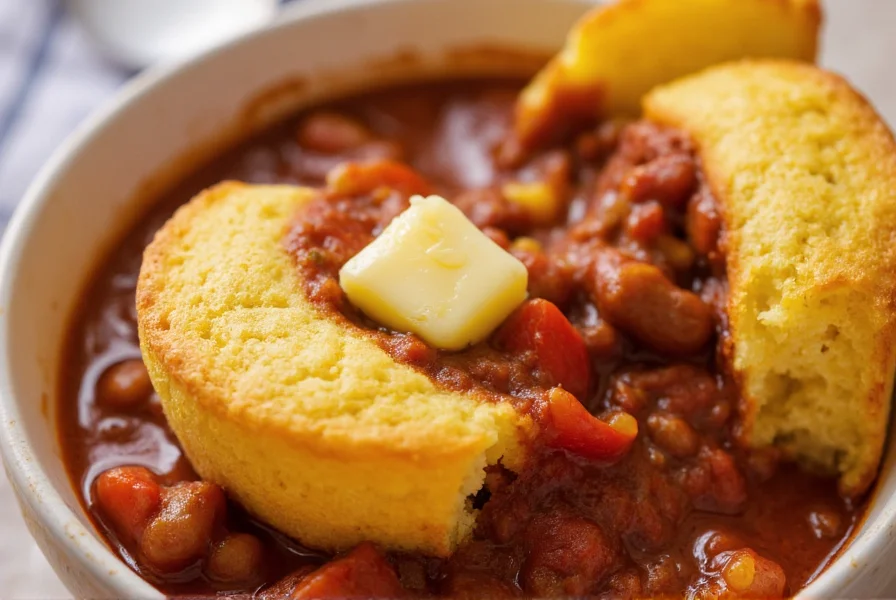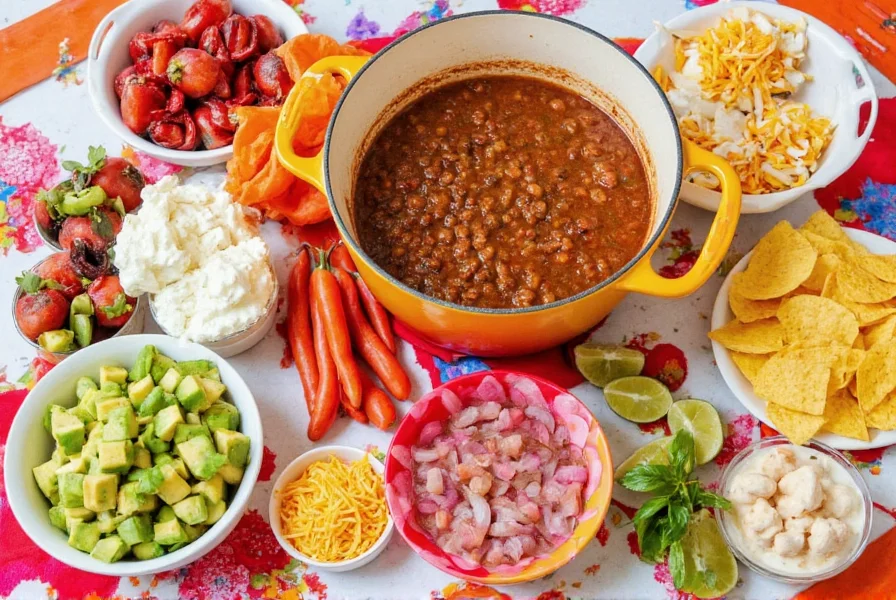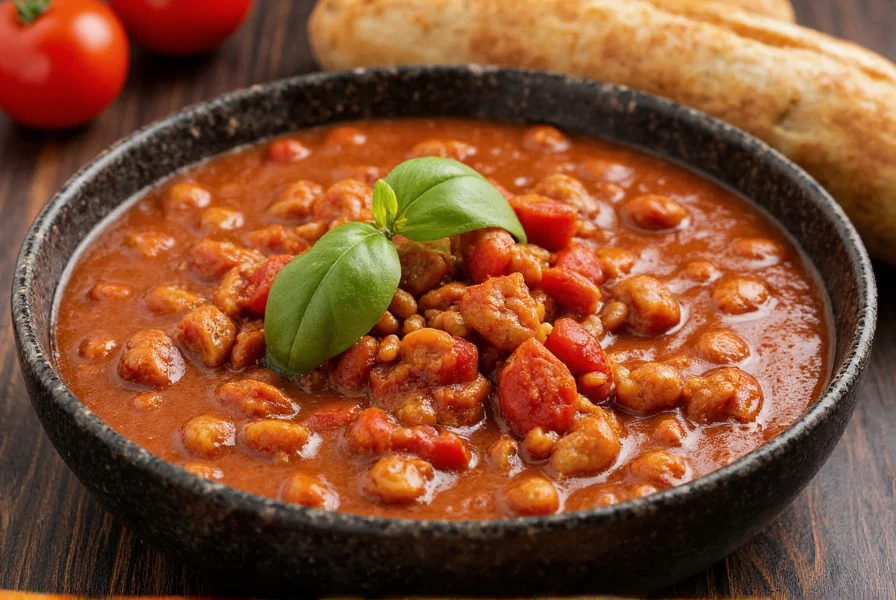When searching for what food goes with chili, you're looking for sides and toppings that enhance rather than compete with this hearty dish. The perfect accompaniments create balance—cooling elements to offset heat, starches to absorb flavors, and fresh components to add brightness. Understanding these principles helps you build satisfying chili meals for any occasion.
Why These Foods Pair Perfectly with Chili
Chili's complex flavor profile—spicy, savory, and often slightly sweet—requires thoughtful pairing. The ideal side dishes serve specific purposes:
- Starchy bases like rice or cornbread absorb chili's liquid while providing a neutral foundation
- Cooling elements such as sour cream or avocado counteract heat
- Crisp textures from toppings add contrast to chili's hearty consistency
- Acidic components like lime or tomatoes brighten rich flavors
| Food Pairing | Flavor Function | Texture Contribution |
|---|---|---|
| Cornbread | Neutralizes spice with mild sweetness | Soft crumb absorbs chili, crispy edges provide contrast |
| Rice | Creates neutral base for bold flavors | Fluffy texture contrasts with chunky chili |
| Sour Cream | Cools heat with dairy fat and acidity | Creamy smoothness against hearty chili |
| Tortilla Chips | Salty contrast to savory chili | Crisp crunch provides textural interest |
Essential Traditional Pairings for Chili
No chili meal is complete without these classic accompaniments that have stood the test of time for good reason.
Cornbread: The Quintessential Chili Companion
What sides go well with chili? Cornbread tops the list for excellent reasons. Its slightly sweet, crumbly texture soaks up chili while providing a contrasting flavor that cools the heat. For best results, serve warm cornbread with butter alongside your chili. The Maillard reaction from baking creates complex flavors that complement chili's deep notes.

Rice: The Universal Base
Rice serves as an ideal neutral foundation that lets chili shine. White rice provides the cleanest canvas, while cilantro-lime rice adds complementary brightness. When serving chili over rice, use a 1:1 ratio of chili to rice for balanced flavor distribution. This pairing works especially well for bean-based or vegetarian chili recipes where additional heartiness enhances satisfaction.
Essential Toppings That Elevate Your Chili
The right toppings transform good chili into an exceptional meal. These additions provide crucial flavor and textural dimensions.
Cooling Dairy Elements
Sour cream, Greek yogurt, or crème fraîche provide essential cooling contrast to chili's heat. The fat content in dairy binds to capsaicin (chili's heat compound), literally cooling your palate. For best results, add these toppings just before serving to maintain their fresh quality. What toppings go well with chili? Dairy elements consistently rank highest for balancing spice while adding richness.
Fresh Vegetable Toppings
Raw onions, scallions, or chives add sharpness that cuts through richness. Avocado provides creamy texture and healthy fats that complement chili's protein. A squeeze of fresh lime juice brightens the entire dish. These elements should be added tableside so their crisp textures and fresh flavors remain vibrant.
Creative Pairings for Special Occasions
While traditional sides work perfectly for weeknight meals, these creative pairings shine for gatherings or when you want to impress.
Bread Beyond Cornbread
Consider these alternatives when wondering what bread goes with chili:
- Biscuits - Flaky layers perfect for sopping up chili
- Focaccia - Herb-infused bread adds Mediterranean flair
- Naan - Unexpected but delicious with Tex-Mex chili variations
- Polenta - Creamy corn porridge makes a hearty base
Unexpected Salad Pairings
A simple green salad with vinaigrette provides refreshing contrast to chili's richness. For something more creative, try a jicama slaw with orange segments—the citrus acidity balances chili's deep flavors while jicama's crispness offers textural contrast. What salads go with chili? Light, acidic options work best to cleanse the palate between bites.
Meal Planning Considerations
When planning what to serve with chili, consider these factors for perfect meal execution.
Dietary Accommodations
For gluten-free needs, skip cornbread and offer rice or quinoa instead. Vegan chili pairs beautifully with avocado and cashew cream. When serving diverse dietary needs, set up a topping bar where everyone can customize their bowl—this approach works especially well for gatherings where you're wondering what to serve with chili for a crowd.
Temperature Balance
Chili's heat (both temperature and spice level) benefits from cool or room-temperature accompaniments. Serve sides at contrasting temperatures—warm cornbread with hot chili, but cold toppings like sour cream and diced onions. This temperature interplay creates a more dynamic eating experience.
Perfecting Your Chili Meal Experience
The best food combinations with chili follow simple principles: balance heat with cooling elements, contrast textures, and provide both hearty bases and fresh accents. Whether you're serving a quick weeknight meal or hosting a gathering, these pairings ensure your chili takes center stage while the supporting elements enhance rather than compete.
Remember that personal preference plays a role—what food goes best with chili ultimately depends on your taste preferences and the specific chili recipe you're serving. Experiment with different combinations to discover your perfect pairing. The most successful chili meals incorporate multiple elements from different categories for a complete sensory experience.

Frequently Asked Questions
What are the best traditional sides for chili?
Cornbread and rice are the most traditional sides for chili. Cornbread's slightly sweet flavor balances chili's heat while its crumbly texture soaks up the sauce. Rice provides a neutral base that lets chili's flavors shine, making it ideal for bean-based or vegetarian chili variations.
What toppings cool down spicy chili effectively?
Dairy-based toppings like sour cream, Greek yogurt, or crème fraîche most effectively cool spicy chili. The fat content binds to capsaicin (the compound that creates heat), literally cooling your palate. Avocado also works well due to its high fat content, while a squeeze of fresh lime juice provides acidic contrast that balances heat perception.
Can I serve salad with chili, and what types work best?
Yes, light, acidic salads pair surprisingly well with chili. Simple green salads with vinaigrette provide refreshing contrast to chili's richness. For more creative options, try jicama slaw with orange segments—the citrus acidity balances chili's deep flavors while jicama's crispness offers textural contrast. Avoid heavy, creamy salads that would compete with chili's heartiness.
What bread options work well with chili besides cornbread?
Several bread options complement chili beautifully: flaky biscuits are perfect for sopping up chili, herb-infused focaccia adds Mediterranean flair, naan provides an unexpected but delicious pairing with Tex-Mex variations, and creamy polenta makes a hearty base alternative. The key is choosing breads with contrasting textures that can stand up to chili's robust flavors.











 浙公网安备
33010002000092号
浙公网安备
33010002000092号 浙B2-20120091-4
浙B2-20120091-4